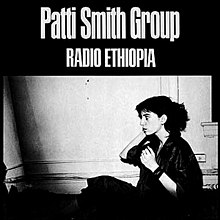Radio Ethiopia
| Radio Ethiopia | ||||
|---|---|---|---|---|
 |
||||
| Studio album by Patti Smith Group | ||||
| Released | October 1976 | |||
| Recorded | 1976 | |||
| Studio | Record Plant Studios, New York | |||
| Genre | Punk rock, hard rock | |||
| Length | 41:15 (original) 48:10 (1996 reissue) |
|||
| Label | Arista | |||
| Producer | Jack Douglas | |||
| Patti Smith Group chronology | ||||
|
||||
| Singles from Radio Ethiopia | ||||
|
||||
| Professional ratings | |
|---|---|
| Review scores | |
| Source | Rating |
| AllMusic | |
| Chicago Tribune | |
| Christgau's Record Guide | A− |
| The Rolling Stone Album Guide | |
Radio Ethiopia is the second studio album by the Patti Smith Group. It released in October 1976 through Arista Records.
Radio Ethiopia was the follow-up record to Smith's widely acclaimed debut Horses. In interviews surrounding the album's release, Smith explained that she chose producer Jack Douglas in hopes of making the album a commercial success. The album was negatively received when it was released and Smith was attacked by critics for what they perceived to be laziness, self-indulgence and selling out.
The title track of the album is one of Smith's most notorious songs, almost legendary for appearing to be "10 minutes of noise". Critics often described live renditions of the song as negative moments of Smith's concerts. Patti herself spoke highly of the track and of how the lyrics refer to Arthur Rimbaud's dying wishes. Arguments both for and against the song have been advanced by critics, fans and music listeners over whether the song truly is an example of the Patti Smith Group's boundary-pushing or merely self-indulgence. Critics in negative reviews cited that Douglas' production placed more emphasis on creating a heavy sound through numerous guitar parts which smothered Smith's vocals and, at times, lamented that all of the album's songs were originals of the group (Smith co-wrote much of the album with bassist Ivan Kral, the band member keenest for commercial success ). "Ain't It Strange" and "Distant Fingers", the latter co-written with Smith's long-time boyfriend Allen Lanier, had both been staples of the Group's concerts long before the recording of Horses.
The album's cover photograph is by Judy Linn, the back of the album features a photo by Lynn Goldsmith. The album was dedicated to Arthur Rimbaud and Constantin Brâncuși. The back cover of the album bears the legend: "Free Wayne Kramer", who at the time was incarcerated in Kentucky following his conviction for dealing cocaine. "Pissing in a River" was released as a single the same year. It was also featured in the 1980 movie Times Square.
...
Wikipedia
